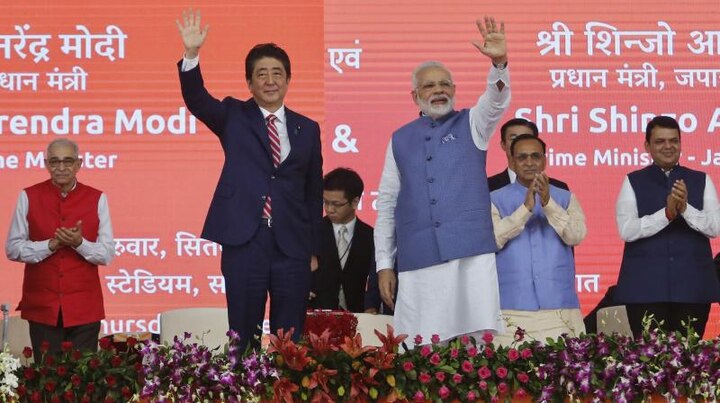Why Shinzo Abe’s victory is good news for India

Political commentators are now saying that Japanese Prime Minister Shinzo Abe’s Liberal Democratic Party’s win in the snap election was a foregone conclusion. But many of them had actually not seen it coming. In the run-up to the poll Abe called a year ahead of schedule, they had raised doubts on his popularity, pointed to alleged corruption and spoke of a ‘weakened’ economy. Early opinion polls had indicated a lukewarm support for the Prime Minister. It was only hours after polling when these projections gave a clear edge to Abe’s party, that the commentators foresaw the win.
That said, Abe certainly took a calculated gamble. He would have lost face if his party had returned with reduced numbers and would been hobbled in his reformative plans for the country. After all, the reason why he disrupted the schedule and went to the people was to sustain the secure mandate he enjoyed and bury the impression that he had lost public trust. Today, the Liberal Democratic Party is stronger than before in the lower House of Parliament, the Diet. The two-thirds majority it had with its partner has been endorsed in the snap election, with the ruling combine getting more than 300 seats in the 465-member House.
While there is a plethora of reasons for the win, four stand out prominently. The first is North Korea. Abe must pay a backhanded compliment to the North Korean leader for the latter’s irresponsible and sabre-rattling methods which led to a deep sense of apprehension in the Japanese public and belief that Abe alone was equipped to deal with the menace. This confidence came from Abe’s strong line against Pyongyang and his Government’s determination to counter it. On the other hand, there wasn’t enough said by Abe’s rivals on the issue.
The China factor was the second reason. The Japanese voters had been clearly rattled by Beijing’s bellicose acts and pronouncement in the region, some of which sought to undermine Japanese interests. They were always worried over China’s actions in the Indian Ocean Region and in the South China Sea, and Abe deftly exploited those fears. Additionally, Beijing’s offensive language against Abe and Japan on North Korea helped the incumbent Prime Minister. After Abe had said that “more dialogue with North Korea would be a dead end”, a senior Chines official had condemned the statement as being belligerent and aimed at creating fissures between allies.
The third reason for Abe’s decisive victory is the change in mindset happening in Japan over the need to revamp the nation’s post-Second World War pacifist Constitution. Abe has indicated more than once that the pacifist charter was past its shelf life and that hanging on to it was counter-productive to Japan’s geopolitical interests. The election win is an endorsement for such a change. Only five months ago, the Japanese Prime Minister had announced plans to revise the pacifist Constitution that had been in place since 1947 when American forces had occupied the country.
In a video message delivered to mark the 70th anniversary of the Constitution, he had outlined a roadmap by which the amendment would be done by 2020. It is clear from the fresh mandate that most Japanese agree with his contention that given the developments in the region — Korea, China etc — Japan could not be stuck in a defensive mode. Article 9, which chains Japan to pacifism and complete renunciation of war, is now seen as a millstone around Japan’s neck.
The fourth reason for Prime Minister Abe’s resounding win has been the near complete absence of a credible opposition to his endeavour. The Party of Hope, which was supposed to render a strong challenge to the ruling dispensation, failed to take off because its popular leader and founder Yuriko Koike, did not contest from the new platform. Could it have happened that if Koike, the charismatic Tokyo Governor, had contested, she could have pulled the rug from under Abe’s feet? One can speculate, but with keeping in mind that her brand of conservatism and failure to take other opposition leaders along, had severely dented the opposition’s prospects in any case.
Abe’s victory is of course good news for India. His rapport with Indian Prime Minister Narendra Modi has been excellent; indeed the two leaders are friends. India-Japan cooperation has grown substantially over the last three years and Japan has invested — and committed to invest — heavily in a range of projects in India, including the Mumbai-Ahmedabad high speed train. The collaborations serve both India’s developmental needs and the Japanese economy. Besides, there is the shared interest in keeping a check on China’s expansionist designs in the region.
After a summit meeting between leaders of the two countries three months after Modi became Prime Minister, Japan committed to invest more than two lakh crore rupees (roughly $35 billion) over five years on various projects in India. Abe’s recent visit to India strengthened bilateral relations.
Meanwhile, the Japanese economy is not doing as badly as Abe’s critics would like one to believe. A recent assessment by the International Monetary Fund talked of Japan’s success in sustained growth and employment opportunities. Abe has also hinted at an economic stimulus, which his rivals have held as an indication that all is not well with the economy but which his supporters claim is another booster. True, there had been a dip in the economy a couple of years ago, but Japan has turned the corner.
(The writer is Visiting Fellow at Vivekananda International Foundation, political commentator and public affairs analyst)
Disclaimer: The opinions, beliefs and views expressed by the various authors and forum participants on this website are personal and do not reflect the opinions, beliefs and views of ABP News Network Pvt Ltd.


























